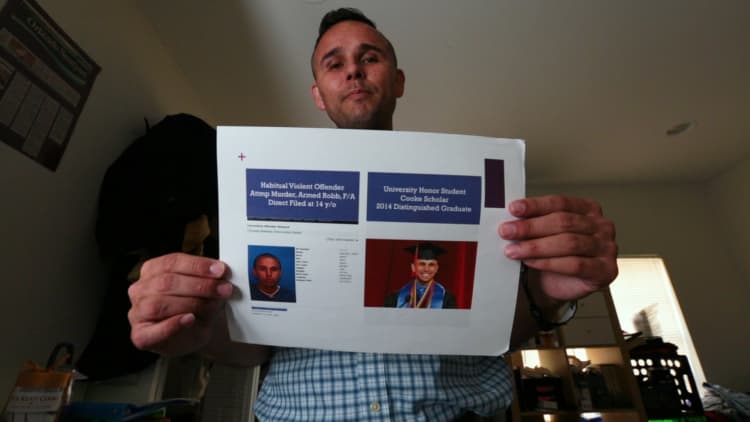Should people with felony convictions in their past be able to vote?
In most of the country, many of them can. But Florida has one of the most uncompromising systems in the country when it comes to voter restoration: It is one of only three states with a lifetime voting ban for all people with felony convictions.
That's the issue Florida voters will see on the ballot this November.
Amendment 4 would automatically restore voting rights for people with felony convictions upon completion of their sentences, including prison, parole and probation. Excluded would be those convicted of murder or a felony sexual offense.
The change to the state constitution would impact an estimated 1.5 million Floridians, according to The Sentencing Project and the Brennan Center for Justice.
That's a lot of people — especially in a state that is often seen as a political petri dish, and one that can swing presidential elections.
One of the people working to restore those voting rights, including his own, is Angel Sanchez.
He's a former gang member from Miami who did 12 years in Florida state prison for attempted murders and robberies. Now, he's living just down the street from the wall he hid behind to avoid shootouts as a teen. Only now, he's a second-year law student.
"I lost my voting eligibilities for life before I had the opportunity to even exercise my voting eligibility," Sanchez said. "Not mature enough to vote but mature enough to lose it for life."
Coral Nichols also can't vote. She is the vice president of Empower to Change Inc., a diversion program for those affected by homelessness, human trafficking and the criminal justice system.
Before she ran a nonprofit office adorned with inspirational quotes, she served five years in a Florida state prison for grand theft and fraud. Before that, she voted in every presidential election she could.
"We are all born with a need to belong, that's why a lot of kids go into gangs," Nichols said. "Voting gives voice to people, you belong to society, you belong to culture. So when my voice matters, then I have a buy-in in the community."
Currently, the only way for someone with a felony conviction to regain his or her right to vote is to ask the governor directly for clemency.
Amendment 4 needs 60 percent of the vote to pass. But it has garnered support across the political spectrum.
There is one organization that is advocating against it: Floridians for a Sensible Voting Rights Policy.
"There are certainly inspirational stories about people who have turned their lives around and whom, most would probably agree, may be entitled to clemency and restoration of voting rights," executive director Richard Harrison told CNBC in an email. "But that decision should be made on an individualized, case by case basis."
Angel sees it differently.
"I am exceptional because people have made exceptions for me," Sanchez said. "And I think if we have a system that doesn't depend on exceptions, but rather making exceptional stories the norm, we will have more stories like mine."
Watch the video above to learn more and to meet some of the former felons fighting for their right to vote.




